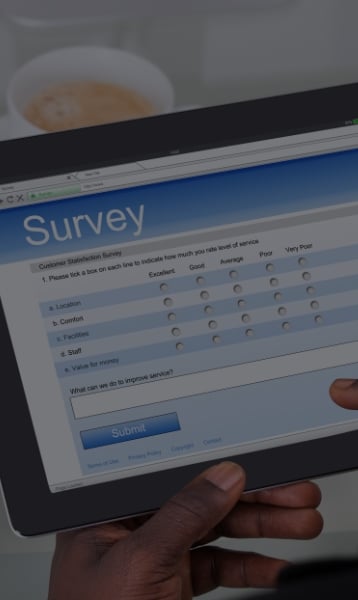The benchmarking portal gives you access to all reports available for STD, LTD, FML & WC.
51% of Employers Cited Employee Satisfaction as their Organization’s Most Important Goal, According to Integrated Benefits Institute Analysis


Jennifer Santisi
IBI published survey data on the value of products and programs that support employee health and well-being
Oakland, Calif. – January 3, 2024 -- The rising costs of healthcare coupled with the stresses of modern working life have made employee health and well-being an increasingly critical priority for employers. Investing in workplace wellness initiatives yields benefits in productivity, absenteeism, recruitment, retention, company culture, and more. However, designing and implementing impactful programs comes with substantial challenges. Employers must balance quality programming with cost management, account for diverse workforce needs, and leverage data analytics to gauge value.
To better understand the value of products and programs that support employee health, the Integrated Benefits Institute conducted a mixed methods research study analyzing survey data from 305 HR professionals in the United States alongside qualitative insights. Data collection focused on factors driving benefits priorities, implementation challenges, partnerships, use of data and metrics, lessons from the pandemic, tensions between employee desires and business objectives, and recommendations for strategic investment.
IBI’s survey found that 51% of employers cited employee satisfaction as their organization’s most important goal, followed by cost mitigation/revenue generation (41%). Forty-four percent of companies collect employee health data either monthly or continuously to assess program value; 72% collect data on satisfaction, 57% on retention, and 52% on productivity – linking insights to both quality and costs. Sixty-four percent of respondents indicated that they conduct formal evaluations of their health programs annually.
Benefits Program Priorities for Employers
Mental health and emotional support are the main priorities for 51% of employers, followed by financial well-being and support programs, health and wellness education, flexibility and work-life balance, and caregiving benefits. Sixty-eight percent of companies report that the COVID-19 pandemic has significantly or moderately influenced benefits program strategies.
Demographic differences arose in the survey results, as employees 30-45 years old had the highest satisfaction rates (88%). They were most interested in work-life balance (28%), financial wellbeing assistance (19%) and health education (18%). Those 46-55 and over 55 years old were most interested in preventative screenings and financial assistance. The youngest group (under 30 years) were most interested in work-life balance and flexibility and fitness and wellness programs.
Adapting programming to new virtual and hybrid work arrangements poses additional hurdles as 45% percent cited balancing remote work, 44% cited isolation/social interaction and 33% managing burnout. Interviews indicate culture has been impacted by these workforce changes and employers have struggled modifying initiatives to engage both onsite and remote employees.
What Does this Mean for Employers?
IBI conducted interviews with experts in the field to reveal actionable insights that can be used as guidance for employers in strategizing around benefit design.
Recommendations for employers include:
- Re-evaluate existing policies and programs to ensure they map to overarching objectives around productivity, growth, efficiency, and other metrics.
- Be intentional around hybrid and remote work—assess which roles are best suited for fully remote, hybrid or in-office work based on business needs.
- Focus on skills and talent development.
- Emphasize outcomes over engagement— leverage data analytics to identify how offerings are impacting health metrics, absenteeism, retention, and productivity.
- Offer training and support for managers.
- Link programs directly to company mission and culture.
- Clear communication and thoughtful change management.
- Streamline point solutions, plan offerings, and policies to reduce confusion.
About the Integrated Benefits Institute
The Integrated Benefit Institute’s independent research, industry-leading tools and data resources help companies link health-related programs to the outcomes that maximize the contributions of people to productivity and business performance. Founded in 1995, IBI is a national nonprofit research organization and business association serving more than 1,600 employer and supplier members and their 22+ million employees. For additional information, please visit www.ibiweb.org and follow us on Twitter and LinkedIn.
- December 2024 (1)
- November 2024 (1)
- July 2024 (1)
- June 2024 (1)
- March 2024 (1)
- February 2024 (1)
- January 2024 (1)
- December 2023 (1)
- November 2023 (1)
- August 2023 (1)
- July 2023 (1)
- May 2023 (2)
- February 2023 (2)
- January 2023 (2)
- November 2022 (1)
- October 2022 (1)
- September 2022 (1)
- March 2022 (1)
- February 2022 (1)
- January 2022 (1)
- December 2021 (1)
- September 2021 (1)
- April 2021 (2)
- December 2020 (1)
- October 2020 (1)
- September 2020 (2)
- August 2020 (2)
- July 2020 (1)
- April 2020 (1)
- March 2020 (1)
- November 2019 (1)
- September 2019 (1)
- July 2019 (1)
- June 2019 (2)
- May 2019 (1)
- April 2019 (1)
- February 2019 (1)
- November 2018 (1)
- September 2018 (1)
- August 2018 (1)
- June 2018 (1)
- March 2018 (1)
- March 2017 (1)
- February 2017 (2)
- Absence (1)
- Absence Management (1)
- analytics (1)
- Behavioral Health (1)
- Benchmarking (2)
- Benchmarking Analytics (1)
- Benefit Design (2)
- Benefits + Plan Design (2)
- Blog (1)
- Business Performance (1)
- CDHP (1)
- CFO Survey (2)
- COVID-19 (6)
- Depression (3)
- director (1)
- Disability Leave (7)
- Extreme Weather (2)
- Family + Parental Leave (3)
- FMLA (2)
- Health + Productivity Management (3)
- Healthcare (1)
- Healthcare Costs (2)
- lost time (1)
- Manage Absence (2)
- Medication Adherence (1)
- Mental + Emotional Health (4)
- Mental Health (2)
- new hire (1)
- Parental / Family Leave (1)
- Patient-Centered (1)
- Press Releases (50)
- Preventive Care (1)
- Productivity (3)
- Research (2)
- Research Report (1)
- Return to Work (1)
- Sick Leave (2)
- Telehealth (1)
- Telemedicine (1)
- Worker's Compensation (1)
- Workplace Health Programs (1)




























